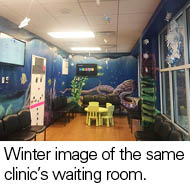
Sept. 12, 2017
When
staff of a Houston-area children’s urgent care clinic saw security-camera images of brown, murky Hurricane Harvey floodwater submerging the waiting room,
they knew it was bad. Quickly, the physicians and other clinic workers jumped
into action. Soon they also consulted the Texas Medical Association (TMA) for
help, and learned about the TMA
Disaster Relief Program.
TMA
recently started the program to help physicians reestablish practices destroyed
by Harvey and its winds and floodwaters. For many doctor’s offices throughout
southeast Texas, damage is terrific. X-ray machines and other diagnostic
equipment, exam tables, instruments, and “inventory” ranging from bandages to stethoscopes to tongue
depressors — as well as office furniture, computers, and everything else one
can imagine in a doctor’s office — all destroyed.
The physicians
are compelled to clear away the mud, mold, and debris and rebuild to open again
as soon as possible for their patients.
“People
need their doctor, and so many of our physicians suffered total, devastating
losses to their medical practices as a result of Hurricane Harvey,” said TMA
President Carlos J. Cardenas, MD. “We wanted to jump in and help them rebuild
or relocate as quickly as possible, because their patients need them.”
 The TMA
Disaster Relief Program
aims to help the countless medical practices across south and coastal bend
Texas facing a similar fate return to caring for their patients as quickly as
possible.
The TMA
Disaster Relief Program
aims to help the countless medical practices across south and coastal bend
Texas facing a similar fate return to caring for their patients as quickly as
possible.
“We feel the loss from a community standpoint. Everybody keeps calling us — people were coming
up to the door even the day after the storm, to get their children seen,” said
Anastasia Gentles, MD, a physician at the NightLight Pediatric Urgent Care clinic. “We
know they’re missing us.” She and her colleagues also want to reopen quickly to
help the people employed in the practice get back to work soon, as many of them
also lost their home or cars in the flood.
Funds
The Disaster Relief Program distributes will help physicians pay for storm loss
expenses their insurance or other sources will not cover. The goal is to raise
at least $1 million.
Organized
medicine across the nation has answered the call. State, national, and
specialty medical societies from coast to coast, in addition to physicians and
others across Texas, already have so far pledged or donated nearly $250,000.
The total amount raised and available thus far is $406,456, thanks to
additional reserves of $160,000 left from similar previous fundraising efforts.
Many medical societies are spreading the word about the TMA fund, urging their in-state
physicians to donate as well.
“Doctors
understand the call to care for their patients, and empathize with colleagues
stripped of the ability to help their people, their community,” said Dr.
Cardenas. “So we’re thrilled — but not really surprised — that these physicians
and their organizations are opening their wallets to help Texas doctors help
Texas patients. This storm was a monster, and communities across the south are
hurting; they need to get back to normal, and they have basic needs like food,
shelter, and health care. We want them to regain that access to their hometown
doctor as quickly as possible.”
The
California, Colorado, Massachusetts and Rhode Island state medical associations
already have pledged or sent generous donations. The American Medical
Association has made the largest donation to date, $150,000.
TMA
created similar fund drives after hurricanes Rita and Ike in 2005 and 2008,
donating between $5,000 and $8,000 to each medical practice in need. TMA
received $700,000 in contributions to the fund in 2008. TMA’s philanthropic
arm, TMA Foundation, is overseeing fundraising,
and The Physicians Benevolent Fund is administering the TMA
Disaster Relief Program. TMA says any Texas physician whose practice was
damaged by Harvey may apply for assistance from the TMA
program (the application should be posted on or soon after Sept. 18).
Watch this video of the floodwaters in the Humble clinic - and hear Dr. Gentles' story.
TMA is the largest state
medical society in the nation, representing more than 50,000 physician and
medical student members. It is located in Austin and has 110 component county
medical societies around the state. TMA’s key objective since 1853 is to
improve the health of all Texans. TMA Foundation
raises funds to support the population health, quality of care and science
priority initiatives of TMA and the Family of Medicine.
--30--
Contact: Brent Annear (512) 370-1381; cell: (512) 656-7320; email: brent.annear[at]texmed[dot]org
Marcus Cooper (512)
370-1382; cell: (512) 650-5336; email: marcus.cooper[at]texmed[dot]org
Connect with TMA on Twitter, Facebook, and Instagram.
Check out MeAndMyDoctor.com for interesting and timely news on health care issues and
policy.